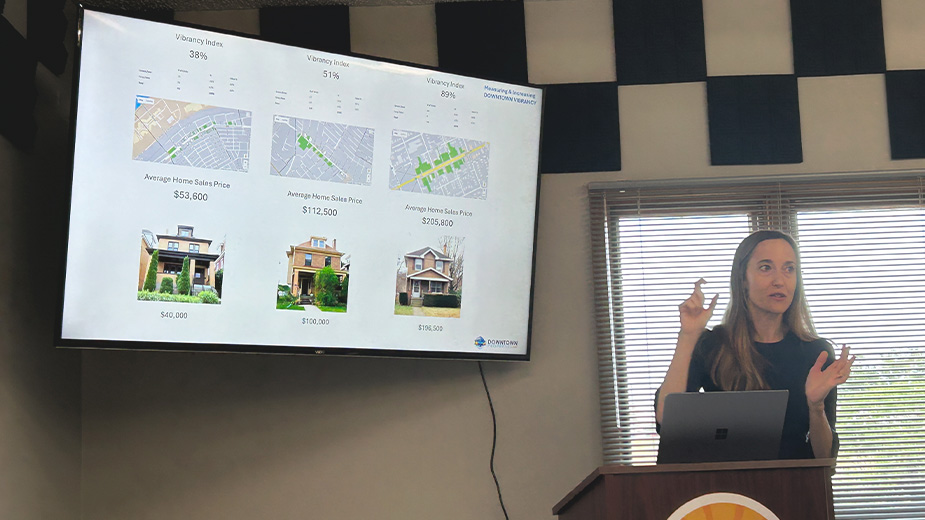Trumbull Considers Reforms to Enterprise Zone Program
WARREN, Ohio – Trumbull County is considering revisions to its enterprise zone program that would make companies more accountable once they enter into tax incentive agreements.
However, the idea is already receiving pushback from local jurisdictions that feel the measure would usurp their ability to negotiate agreements for their respective communities.
“I don’t think it’s going to fly in the village,” said Lordstown Mayor Arno Hill. “Since General Motors is gone, we have to look out for ourselves.”
Nicholas Coggins, assistant director of the Trumbull County Planning Commission, said members of the community have over the years expressed concerns about tax abatements issued to companies that either don’t produce enough jobs or fail to hire local contractors and tradesmen for new construction.
“We wanted to make sure there was something uniform to ensure that local contractors are being used and local people are being employed,” he said. “We want the residents to see benefits from an industry being there. We want them to see the value in it.”
A draft plan of the proposal was presented Friday during a meeting of the Trumbull County Tax Incentive Review Council. The council voted to approve 23 out of 24 existing enterprise zone agreements.
One agreement with Flex Strut Inc. is set to expire, so it did not require renewal.
As it stands, companies looking to make sizable investments into their businesses and pledge to create a certain amount of jobs are able to apply for abatements on real estate taxes for a 10-year period. Townships are able to abate a maximum of 60% of these taxes, while incorporated areas can forgive as much as 75%, unless the local school district agrees to forgive more.
Under the new concept, the county would apply a point-scoring system that would determine the level of abatement each project receives, Coggins said. Companies that accumulate more points would be awarded bigger abatements.
Those companies that qualify for tax incentives would receive a base 25% abatement on property taxes for five years. However, any additional incentives would depend on several factors, including the amount of the investment, the number of jobs created and the average annual salary of new jobs. Additional points would be awarded if a company uses local labor to construct an addition or new building, builds or expands on a brownfield site, and uses private financing for the project.
Each point is equivalent to 1% of the abatement. Every 10 points adds two years to the five-year base.
For example, a company that invests between $9 million and $11 million on a project would score 12 points, or another 12% in addition to the 25% base, according to the draft proposal. Should that same company hire between 41 and 60 workers, it would add another 19 points, or 19%. Were the average annual salary of these new jobs to fall between $50,001 and $60,000, it would add another 20 points to the project.
Using local labor or building on a brownfield would add another 10 points, according to the plan.
Under this scenario, the company would easily qualify for the full tax abatement over a 10-year period.
On the other hand, a company investing less than $1 million and hiring fewer than five new employees would earn just two points for each category. An average annual salary of less than $30,000 annually for each employee would result in zero points.
“As a county, we wanted to show that we’re putting forth the effort, that we’re hearing the complaints, that we’re hearing the concerns,” Coggins said.
Coggins emphasized that any revision to the existing abatement structures would require approval by all of the 29 subdivisions that fall within the enterprise zone in Trumbull County.
In addition, any resolution changing the enterprise zone program would also need approval from the state, he said.
“We’re doing something to make it uniform, reliable and make it a consistent payback to the county,” Coggins said. Tax abatements, he added, are an important tool to attract and encourage businesses. But he also stressed the need to protect the community’s interests as well.
The vast majority of property taxes are used to support local school districts, but they are also used to help fund services in the community, noted Trumbull County Commissioner Niki Frenchko.
Coggins acknowledged that the plan is likely to change as more input is gathered from municipal and township officials. Or, there’s a chance that it won’t be approved at all, since the plan calls for a consensus from all of the communities within the enterprise zone.
Hill said that while there are some merits in the new plan, he thinks the county is overstepping its authority when it comes to negotiating enterprise zone deals. Under the state program, municipalities and unincorporated areas have the right to negotiate their own agreements.
Lordstown has negotiated several large enterprise zones over the last several years, including an abatement of 100% for the $1 billion Lordstown Energy Center, an abatement of 75% for the $2.3 billion Ultium Cells project, and another 75% in tax incentives for the $160 million TJX HomeGoods distribution center project.
“I feel that they’re trying to take the right for us to have our own destiny in the village,” Hill said. “We know our communities, we try to work with our schools.”
Copyright 2024 The Business Journal, Youngstown, Ohio.



